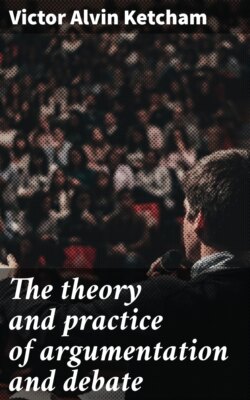Читать книгу The theory and practice of argumentation and debate - Victor Alvin Ketcham - Страница 55
На сайте Литреса книга снята с продажи.
6. That evidence should be selected which will appeal most strongly to those to whom the argument is to be addressed.
ОглавлениеIn presenting an argument the writer or speaker must not always rely upon his own judgment as the criterion of the value of evidence. He must take the standpoint of those who are to hear or read. This attitude presupposes that the evidence offered is reliable. If a speaker or writer knows that evidence presented is unreliable but will nevertheless be accepted by his auditors or readers, he is perpetrating a fraud if he offers it. That reliable evidence which is most likely to appeal to those before whom it is to be placed should be selected. The arguer should put himself in the position of the persons to be persuaded, and ask himself the question, “What evidence would most strongly appeal to me and induce me to believe and act in the manner desired if I were the person to be persuaded?” The accuracy with which the advocate can perform this feat often measures his success. It requires the highest order of constructive imagination. He must view his position with all the prejudices and preconceived ideas, as well as the personal interests, of the persons to be persuaded. He must, for the time being, lose his character as an advocate and assume that of the reader or hearer.
In quoting opinions of authority this attitude of mind becomes most important. If the argument is to be addressed to an individual, the opinion or action should be cited of some person in whom that individual reposes confidence. If you wish to persuade John Jones to follow a certain course of action, and you are aware that his most intimate friend and the one to whom he looks as a model of discretion and good judgment is Smith, you can do no better than to quote the opinion of Smith, if Smith has expressed himself as favoring your contentions or if he has followed the course of action which you desire Jones to follow.
In addressing an organization of workmen it is effective to quote the opinions of their high officials in whom they repose trust and confidence. Likewise in addressing the members of any trade, profession, business, religious faith, or political party, the opinions of persons high in their particular field of endeavor may always be quoted. Sources of authority with which the audience is likely to be in sympathy should be especially emphasized.
In selecting evidence with which to prove the truth or falsity of a proposition too much care cannot be exercised. The foregoing rules should be adhered to strictly. They should assert themselves automatically. It is not enough for the student to have these rules of argumentation so well in mind that he can recite them in class and give them when asked for in an examination; he should have them so well in mind that they become a part of the argumentative process. If these rules can be remembered only with difficulty they will not be used, because it would involve too much trouble to stop and apply each rule to every fact and opinion offered in evidence. After the rules are thoroughly mastered, a half-hour’s practice in their application will serve to fix the habit of judicious selection of evidence so well in mind that the process will become automatic.
These suggestions in regard to the rules for selecting evidence apply with equal aptness to all other rules in this book. The person who wishes to become a master of argumentation must be able to command the rules of the art.
SUMMARY OF RULES FOR SELECTING EVIDENCE
1. The evidence must come from the most reliable source to which it can be traced.
2. A person quoted as authority must be unprejudiced, in full possession of the facts, and capable of giving expert testimony on the point at issue.
3. The evidence should be examined to determine whether there are any attendant circumstances which will add to its weight.
4. The selection of evidence must be fair and reasonable.
5. The position and arguments of the opposition should be taken into consideration.
6. That evidence which will appeal most strongly to those to whom the argument is to be addressed should be selected.
